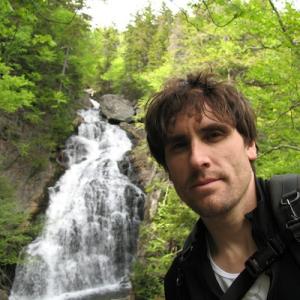
Frank Stewart
Adjunct Associate Professor
I am an environmental microbiologist interested in the dynamics of microbial systems. My research is motivated by the beliefs that microbes are a frontier for natural history and scientific discovery, and that exploring this frontier is necessary and important for understanding biological diversity and its changing role in ecosystem processes. The first major research theme in my lab explores how aquatic microbes respond to environmental change, notably declines in ocean oxygen content. The second major theme explores how life in symbiosis drives microbial evolution and ecology. My research targets diverse systems, from the marine water column to the intestinal microbiomes of fishes. This research aims to identify metabolic properties that underlie the ecology of microbes and microbe-host systems, the evolutionary context under which these functions arose, and the role of these functions in ecosystem-scale processes in a changing environment.
I am an Associate Professor in the Department of Microbiology and Immunology at Montana State University and an Adjunct Professor in the School of Biological Sciences at Georgia Tech. I received a B.A. in Biology from Middlebury College and a Ph.D. in Organismic and Evolutionary Biology from Harvard University. I worked as a Postdoctoral Fellow at MIT for two years before moving to Georgia Tech in January 2011. In February 2020, I moved my lab to the mountains of Montana. My work has been recognized through an NSF CAREER award, a Sloan Research Fellowship, and a Simons Foundation Early Career investigator award.
frank.stewart@biology.gatech.edu
404-894-5819
Office Location:
ES&T 1242
Georgia Institute of Technology
Bacteria and Archaea constitute the overwhelming majority of genetic and metabolic diversity on this planet. To understand these organisms in their native habitats, environmental microbiologists are tasked with two fundamental questions. First, how do ecological and evolutionary processes (e.g., symbiosis, competition, recombination, natural selection) create and structure genetic diversity? Second, how is this genetic diversity linked to the diverse biogeochemical functions of microorganisms in nature? Our research explores these questions for marine microorganisms, using the tools of genomics and molecular biology. We are particularly interested in how microbial genome evolution and physiology are affected by symbiotic interactions with higher taxa. In tandem with this work, we study free-living microorganisms, as they provide important reference points for understanding symbiont biology and mediate key global biogeochemical cycles in the ocean's water column and sediments. In particular, we are interested in how oxygen loss affects the diversity and metabolism of marine microbes. Our research integrates the broad fields of microbiology, molecular evolution, and marine biology. This work has both descriptive and experimental components, and involves a blend of field, molecular, and bioinformatic techniques, the latter focused in part on the analysis of high-throughput sequencing datasets. We welcome inquiries from potential students, post-docs, and collaborators who share these interests.
IRI Connection:




